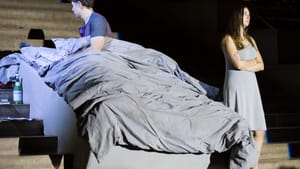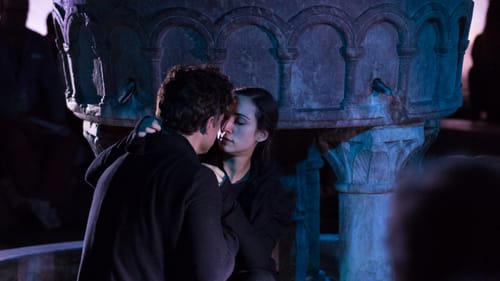Stay in the Loop
BSR publishes on a weekly schedule, with an email newsletter every Wednesday and Thursday morning. There’s no paywall, and subscribing is always free.
What is it good for?
Opera Philadelphia's O17 Festival presents 'War Stories'

A critic once described casting Patti LuPone in As You Like It as “a brainstorm at night and a nightmare in the morning.” The same could be said for Opera Philadelphia’s decision to stage War Stories, a complex double bill spanning centuries and musical styles, at the Philadelphia Museum of Art (PMA).
Two works, multiple vices and virtues
Site-specific productions have gained in prominence in recent years, rising alongside trends for period authenticity in performance style. War Stories, an O17 Festival entry, has both elements going for it. Il combattimento di Tancredi e Clorinda (The Combat of Tacredi and Clorinda), the 1638 scena by Monteverdi that opens the evening, unfolds in PMA’s intimate medieval stone cloister. The action then moves to Great Stair Hall for Lembit Beecher and Hannah Moscovitch’s I Have No Stories to Tell You, a harrowing study of modern warfare’s psychological impact on its participants. Both works utilized a period-instrument ensemble, conducted from the harpsicord by Gary Thor Wedow.
Musically, the evening had nothing but virtues. The cloister’s acoustics allowed the voices of the Monteverdi’s four soloists — mezzo-sopranos Cecelia Hall and Abigail Levis, baritone Craig Verm, and tenor Samuel Levine — to envelop the audience. When the same group of singers transitioned to Beecher’s contemporary work, they showed themselves adept interpreters of his jagged compositional style. Fine actors all, they connected equally well with Monteverdi’s antiquated Italian text and Moscovitch’s hyper-American libretto. Levine especially shone in both operas; I’m dying to hear his weighty, baritonal tenor again, in anything.
As a dramatic venture, though, the concept fell flat. Due to the cloister’s spatial limitations, Il combattimento had to be performed twice. This made for a lot of waiting around. I was in the evening’s first group, meaning an hour passed between operas (the production also includes a 25-minute intermission). Those waiting were invited to peruse PMA’s collection of arms and armor, but I fled to the bar after a couple of minutes to escape the choke of conversation swirling around the Kretzschmar von Kienbush Galleries.

Life during wartime
Il combattimento has a thin, ridiculous plot: a Christian soldier kills a Muslim rival during the Crusades, only to learn it’s really his girlfriend in disguise. Thus, the only way to make it work is through a strong directorial vision. Staging it in a medieval cloister must have looked great on paper, but Robin Guarino’s execution left much to be desired.
The square, colonnaded room with a huge stone basin at its center created many sightline issues. Although Hall sang gloriously as Clorinda, much of her physical performance was lost to me. I also lacked a clear view of the opera’s arresting final tableau of Tancredi baptizing the dying Clorinda. From where I sat, the image of Tancredi towering over Clorinda’s prone body, set at torso level, more closely resembled a lewd sex act.
I Have No Stories to Tell You fared slightly better. Seeing the Great Stair Hall strewn with the detritus of modern life — newspapers, Pellegrino bottles, cigarette packs — immediately suggested the troubled mind of Sorrel (Hall), a soldier gripped by post-traumatic stress disorder. But even from a front-row seat, the action often felt miles away as the performers traversed the large and looming staircase. The unsubtle and unnecessary use of amplification only furthered the divide between performers and the audience.
It’s a shame, because Beecher’s 45-minute opera, which premiered in 2014, is one of the best pieces of new music I’ve heard in years. He smartly uses contrapuntal writing to suggest the emotional distance between Sorrel and her civilian husband since her return from combat. A trio of female voices (Levis, Sarah Tucker, and Rachel Calloway) hauntingly evoke the unwanted memories that interrupt Sorrel’s sleep, steering her towards an ever-present flask. Moscovitch’s sensitive, probing libretto never relies on weary, worn-out war tropes. These are real people — an increasingly rare sight on the opera stage.
What, When, Where
War Stories. Il combattimento di Tancredi e Clorinda by Claudio Monteverdi and I Have No Stories to Tell You by Lembit Beecher and Hannah Moscovitch. Gary Thor Wedow conducted, Robin Guarino directed. Opera Philadelphia. Through September 23, 2017, at the Philadelphia Museum of Art, 2600 Benjamin Franklin Parkway, Philadelphia. (215) 732-8400 or operaphila.org.
Sign up for our newsletter
All of the week's new articles, all in one place. Sign up for the free weekly BSR newsletters, and don't miss a conversation.

 Cameron Kelsall
Cameron Kelsall